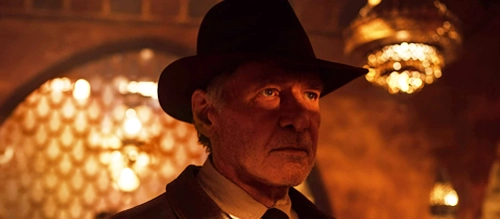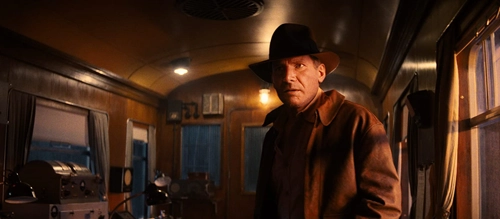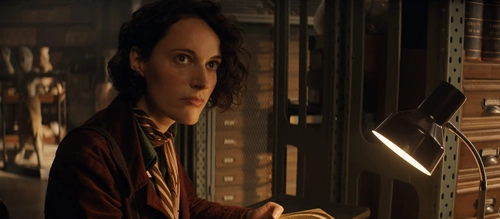Indiana Jones and the Dial of Destiny (2023) Review

Indiana Jones and the Dial of Destiny (2023)
Director: James Mangold
Screenwriters: Jez Butterworth, John-Henry Butterworth, David Koepp
Starring: Harrison Ford, Phoebe Waller-Bridge, Ethann Isidore, Antonio Banderas, Boyd Holbrook, Shaunette Renée Wilson, Mads Mikkelsen, John Rhys-Davies
What does an 80-year-old globe-trotting archaeologist with experience of the occult, religious phenomena, ancient aliens and fighting Nazis have left to fear? Time.
42 years have passed since Harrison Ford first donned the fedora and stepped onto our screens as Indiana Jones in Raiders of the Lost Ark (1981). If you were to go back 42 years from the release of that first adventure, you’d be in 1939, months away from the Nazis invading Poland and plunging the world into its 2nd World War. He may not move quite like he once did, but his eyes still glimmer the same. Harrison Ford is still Indiana Jones.
In 2023’s Indiana Jones and the Dial of Destiny, it’s 1969 and the United States is about to land a man on the moon – a mission Indiana describes as ‘a pointless endeavour to a world of nothingness’. He’s characteristically grumpy, upset by his personal circumstances, and frustrated by being pushed into retirement from his work as a college professor. His joints are a little sore and he needs a break from the noises of modern life. When a voice from his past arrives asking questions of an ancient dial said to predict when and where fissures in time will occur, he is forced into an adventure for one more artefact. One that, of course, belongs in a museum…
The dial is believed to offer the opportunity of time travel to the person who correctly navigates it, though Indiana Jones is quick to dismiss that as “magic, not science”, adding the caveat that he has seen things he can’t explain. “Sometimes,” he says, “it’s not about what you believe, but about how hard you believe it.”
It is no coincidence that the ultimate MacGuffin of the 2023 version of Indiana Jones is time itself. Forty-plus years on from his debut, and in the twilight of his life, time is the greatest fear of all. The possibility that he might be able to control it is enticing, and the fear that someone else could wield it is potentially world-shifting. The latter is even more monumental when those chasing it are Nazis. “Why is it always Nazis?”
The Nazis, the MacGuffin, the title itself… it’s all very Indiana Jones, all very nostalgic. In this respect, Dial of Destiny is very in-keeping with the recent Hollywood trend of maximising Intellectual Property (IP) by restoring interest in the legacies of their most famous characters. It’s a shrewd streaming-era business move that attempts to bring eyes to the original films on Disney Plus almost as much as it aims to make its own money. And yet, while Dial of Destiny can certainly be seen through this lens, the film offers more than the neglectful offerings available elsewhere, incorporating legacy into its narrative not to simply celebrate an IP a studio wants to freshen up, but to offer a timely and important commentary on the preservation of old film techniques, to warn against the dissolving of film preservation, and to pay homage to the classic cinema that paved the way. Yes, Indiana Jones and the Dial of Destiny is a film about films.

The movie opens with a sequence directly ripped from the 2nd half of Buster Keaton’s monumental silent-era action-comedy The General (1926), complete with train surfing, bad guys shooting at other bad guys by accident, and water pumps proving to be inescapable obstacles. Almost 100 years on, it remains as exciting and effective as it ever was. We are subsequently launched into a first act in which Jones is woefully underestimated, a sure comment on how the current era of studio filmmaking underestimates the masters. Dial of Destiny of course pays tribute to the films within its own franchise, and specifically the moments that made us fall in love with it, but it’s in Indiana’s supporting characters Helena (Phoebe Waller-Bridge) and Teddy (Ethann Isidore) that the message of the film is truly illuminated.
Helena and Teddy each undergo character arcs that transition them from heartless capitalists looking for a quick buck and a quick exit to loving people willing to risk it all for those who risked it for them, an early line from Waller-Bridge dismissing theft with the claim, “that’s capitalism”, being fantastically juxtaposed by a later act of kindness. In the face of time-pursuing Nazis, they develop into a poignant mirror to the Nazi villains led by Mads Mikkelsen’s Jürgen Voller, a group defined in this movie not by their racist ideologies but by their fierce dedication to exploiting the past for personal gain. They pursue the dial so they can change the past, their intention to restore Nazi dominance, just as the studios use their ownership of artefacts of cinema to revisit the past and create new avenues of revenue to re-establish their dominance with, or politicians revisit past colonialist ideologies and psychological techniques in an attempt to seize power and control over the populace – even if that might be of detriment to everyone, including themselves.
Indiana is, as a result, a beacon of hope. A hero we look to as a means to restore our faith that filmmaking can be more than exploitative nonsense. Just as Top Gun: Maverick reassured us in 2022 of how better action films can be made away from the CGI norm of the 21st century, and how the old masters still have important contributions to offer, Indiana Jones and the Dial of Destiny attempts to reassure us that good filmmaking ought not to suffer at the hands of exploitative business practices. It isn’t as well-made – its heavy reliance on computer generated imagery a better-than-expected 8 out of 10 but still not as whirlwind nor revolutionary as its 2022 brethren, and so much of the film is very dark (likely too dark for a family watching on Disney Plus to enjoy during the day time) – but if there was a hero to remind us of why we need movie stars and why we need movies, Indiana Jones is the one. A film franchise built on the back of paying homage to filmmakers from eras gone by, brought back to remind us of the power of the filmmaker even in a corporate world looking to constantly rinse every property of its last drop of quality and appeal. It feels right.
And why always Nazis? Homage to the rest of the franchise, sure. But also because they’re the ultimate representatives of strict and damaging ideological practices. And mostly, because we’re still fighting them in real life. This is 2023, and the far right is more prevalent than it has been for decades – they’re still here.

Phoebe Waller-Bridge’s Helena is perhaps the best of the new additions to the cast, her character being everything you’d want from a well-travelled, brave and intelligent archaeologist but without any of the objectification or perfectionisms of previous women heroes in male-dominated franchises. She is positioned within the narrative as a relative, a parent figure, a fish out of water, but never an object. She is cunning but she is also excitable. She is, simply, a well-written character, and a fulcrum around whom many of the film’s biggest character developments occur.
The writing team of Jez Butterworth, John-Henry Butterworth, David Koepp and director James Mangold must be commended for the depth of their allegories and the consistency of their message. And Mangold must, as the first director of an Indiana Jones movie that isn’t the legendary Steven Spielberg, be praised for ensuring so many of these allegorical elements, character arcs and titbits of excitement and interest remain present in his completed vision. There are moments where Mangold lets the action go for a little too long, and others where he abandons absolute realism in a way you couldn’t foresee early-era Spielberg doing, but this looks and feels every bit as much an Indiana Jones film as the others, while expertly navigating its new territory. The collective work of Mangold and the screenwriting trio isn’t perfect, and Indiana Jones and the Dial of Destiny isn’t a perfect film, but it is good. And it is Indiana Jones.
Reassuringly scored by the old master John Williams, and starring a suitably sparky Harrison Ford, Indiana Jones and the Dial of Destiny feels in many ways like a last hurrah for those who got so many of us into the magic of the movies. It pays homage to the history of American cinema, to the origins of the Indiana Jones franchise, to the very idea of cinema itself in the streaming age. And as Indiana Jones himself suffers from being too attached to the past, from being shunted to the edges of society and let go by the culture he lives within, we are poignantly shown just how much we need him, and how much we should cherish him.
There are some who will say that Indiana Jones belongs in the past. That he’s too old, that the ideas are overplayed. Indiana Jones and the Dial of Destiny proves that those people are wrong.
Score: 18/24
Recommended for you: Indiana Jones Movies Ranked

